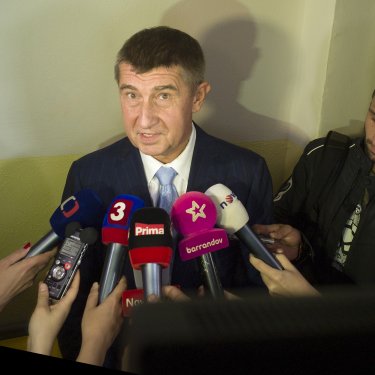Local oligarch conflicts of interest dominate Czech media

Long regarded as an example of successful integration into the European Union, the Czech Republic is now seen a country where media freedom is increasingly threatened because the ownership of its media has been concentrated in the hands of a few billionaires.
Just a few years ago, 80% of its media were controlled by foreign – mainly German – investors but, after the 2008 crisis, they were quickly replaced by local billionaire businessmen who make no bones of the fact that they see these acquisitions as a way to gag critics.
The new owners of the newspapers, radio stations and TV channels are turning them into weapons for conquering and securing political or economic power, or both. It is another example of the threat to media freedom posed by oligarchs the world over, as Reporters Without Borders (RSF) highlighted in its latest report.
“Certain owners and politicians in the Czech Republic have realized that control of the media is a massive deterrent that can help to silence opponents,” said Pauline Adès-Mével, the head of RSF’s Europe-Balkans desk. “But the way they use their media outlets results in a loss of trust on the part of the public, for whom the media are increasingly discredited.”
Andrej Babiš, the owner of the food and agro-industrial group Agrofert and the Czech Republic’s second richest man, entered politics and took over the MAFRA media group in 2013, thereby gaining control of the two most influential dailies (Lidové Noviny and Mlada Fronta Dnes) and the most popular news website (iDnes.cz).
He went on to acquire one of the biggest privately-owned radio stations (Radio Impuls) and the music TV channel (Óčko).
His populist political party, Action of Dissatisfied Citizens (ANO), caused a stir by coming second in the 2013 parliamentary elections. He established an alliance with two other political groups and, in January 2014, became deputy prime minister and minister of finance. As a result, he has been dubbed “the Czech Berlusconi” or “Babisconi.”
Media specialist Vaclav Stetka regards what is happening in the Czech Republic as unprecedented. “The same man holds the reins of the Czech government, owns the country’s second biggest fortune, runs one of the most influential political parties, and controls the most powerful media outlets.”
There is no shortage of examples of his interfering in his publications. In January 2014, Babiš had Vladimir Sevela fired from his job as journalist with the daily Dnes after Sevela dared to publish criticism of Agrofert. A few months later, he lectured another journalists with his group who had failed to cover a one of ANO’s press conferences.
There are other billionaires who have taken a recent interest in the press and have used part of the fortunes they made in the privatizations of the 1990s to invest in media outlets.
Daniel Křetínský, who runs one of the country’s biggest energy conglomerates, also now heads several newspapers once owned by a joint venture consisting of Switzerland’s Ringier group and Germany’s Axel Springer group. He also owns the biggest football club, Sparta Prague.
Zdeněk Bakala, the former owner of a mining complex, now owns a business daily, a weekly and a news website. Some of the journalists at Respekt, Bakala’s weekly, say they preferred censoring themselves instead of writing on the magazine's owner.
Investment company Penta co-owner Marek Dospiva runs a group of dailies with a regional print media monopoly, which he seems to think guarantees him a degree of impunity. When a journalist recently asked him about his interest in newspapers, he replied: “I won’t beat about the bush. The fact that we own these media ensures that it will be harder for anyone to attack us.”
Another businessman, Jaromir Soukup, owns a TV channel and two weekly publications.
We should be alarmed by the way these billionaires have seized economic, political and media power. It is clear that their aim is to silence all criticism, not promote media independence. Far from improving media freedom and pluralism, the departure of foreign investors and their replacement by local businessmen has just reduced the independence of the leading media even more.
The Czech Republic is ranked 21st out of 180 countries in RSF’s 2016 World Press Freedom Index.



